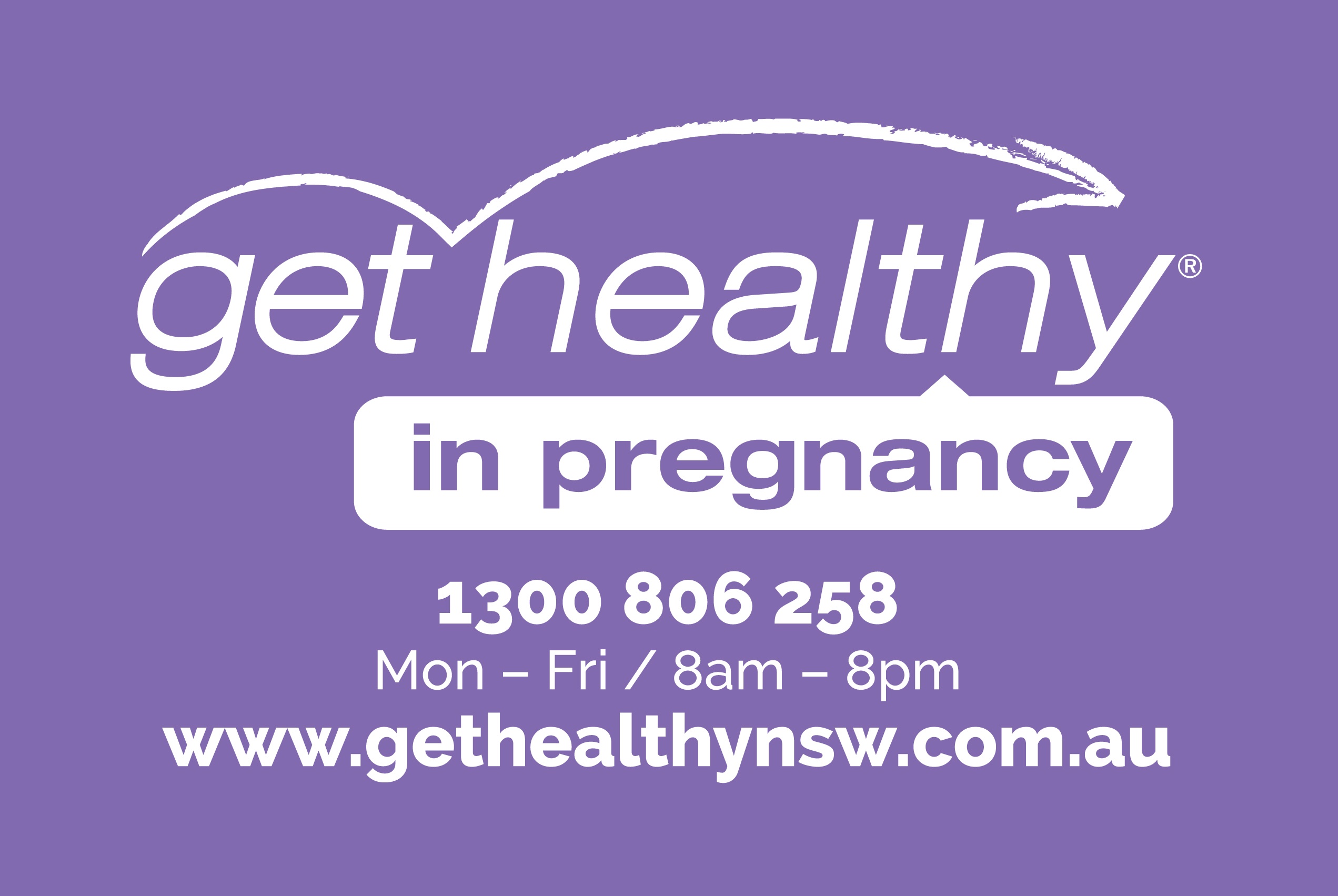
Pregnancy Care at John Hunter Hospital
Our focus for maternity care is to ensure that it is collaborative, where the woman and her family remain at the centre of the care experience and are actively involved in all decisions about the pregnancy, birth and after your baby is born. All decision making is based on relationships of mutual respect and trust.
To assist you to learn more about our services and the options of care available, please click the links below
Now that you are pregnant
Now that you are pregnant
Your care begins with your General Practitioner (GP), by confirming your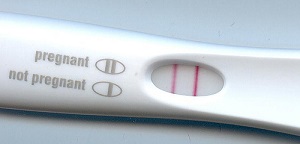 pregnancy, taking a comprehensive health and medical history, ordering your blood tests and may order an 8-week obstetric ultrasound (if and when appropriate).
pregnancy, taking a comprehensive health and medical history, ordering your blood tests and may order an 8-week obstetric ultrasound (if and when appropriate).
Your GP will also send a referral to the John Hunter Hospital (JHH) Maternity Services for your Initial Maternity Assessment and Planning (IMAP) visit.
You will be contacted with an appointment to attend your IMAP visit at JHH Antenatal Outpatients Clinic between 11-14 weeks.
The IMAP visit is a comprehensive visit which involves -
- A visit with a midwife who will complete a full medical and previous pregnancy history and physical assessment
- A routine wellbeing ultrasound scan of your baby, Nuchal Translucency Scan and screening for blood pressure conditions in pregnancy
- A visit with an obstetrician, who will discuss your scan results. Together with the midwife, ongoing pregnancy care within JHH maternity services (inclusive of Belmont Midwifery Group practice and home birth options), see options of care table below.
Need to know information about your IMAP Visit:
- Blood tests are required prior to attending your IMAP visit. These need to be done from 11 weeks' gestation and 3-5 days prior to your scheduled IMAP appointment.
- Your GP will give the necessary blood test request forms.
- You will receive your IMAP appointment date and time via a text message. This text will also include links to mportant information about your appointment. Please ensureyou read through this information prior to your appointment.
If your IMAP appointment is after 14 weeks gestation, the history taking, and planning visit will still take place with the doctor and midwife.
Normal Pregnancy Timeline
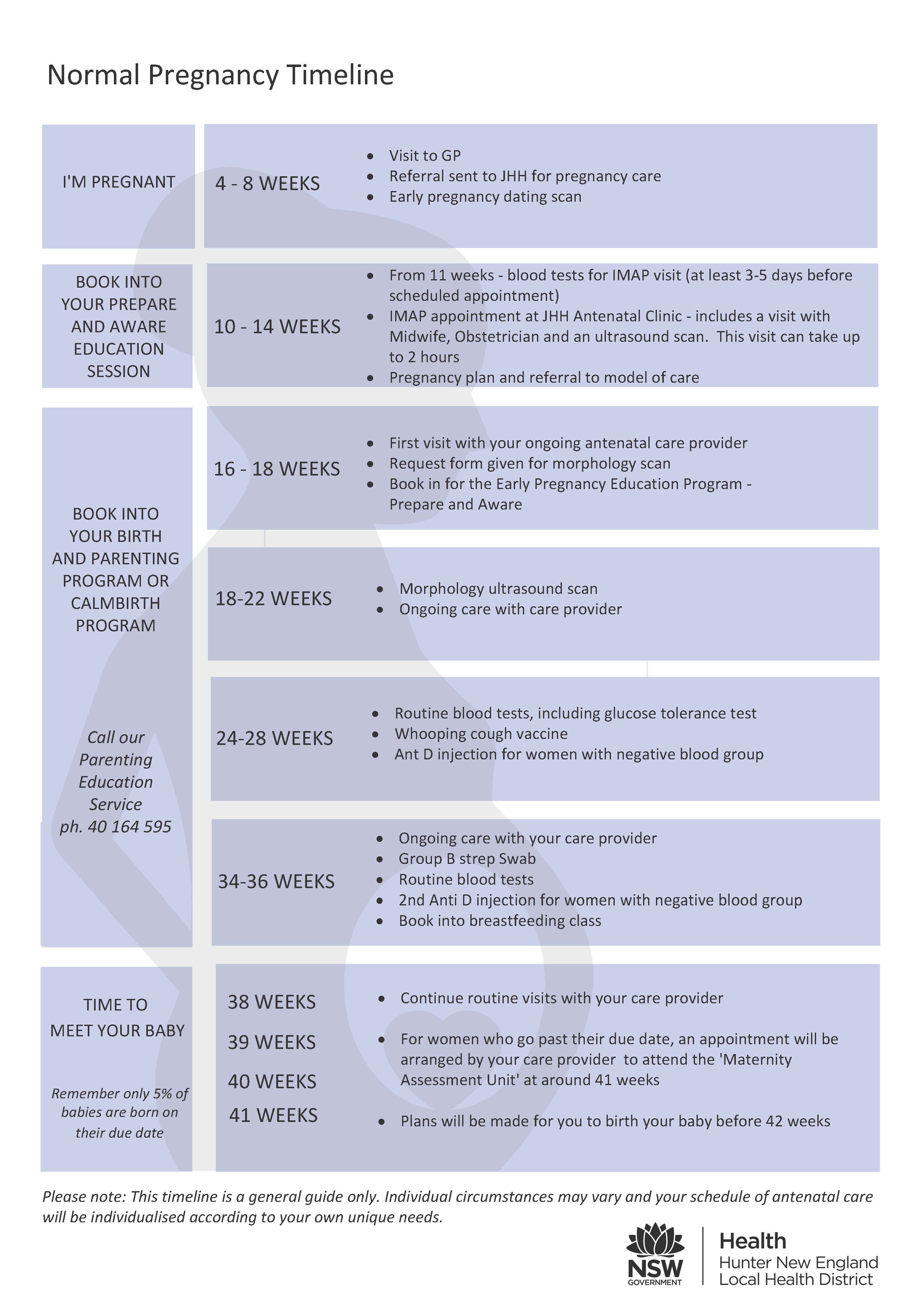
Options of pregnancy care
Options of pregnancy care
Midwifery care in community clinics
Community Antenatal Clinics make our services more convenient for women to access ongoing antenatal care in their local communities. These clinics are run by midwives and are for healthy pregnant women with normal risk for medical or obstetric conditions. You may choose a Community Clinics near you:
- Newcastle Community Health Centre: Monday to Friday
- Belmont Hospital: each Monday and Friday
- Toronto Community Health Centre: each Tuesday
- Tomaree Community Hospital: each Tuesday
- Raymond Terrace Community Health Centre: each Thursday and Friday.
Shared care with your GP
Shared care means that you are cared for by your GP in consultation with the hospital doctors and midwives. You will need to come to your nearest Community Antenatal Clinic for a Booking-in visit, and a second visit usually around 36 weeks at JHH. Your baby will be born at JHH Birth Suite. Shared Care enables you to continue seeing your family doctor, who you already know and trust, during your pregnancy, and this may be more convenient for you.
Belmont Midwifery Group Practice (BMGP)
If you are a healthy woman with normal risk for medical or obstetric conditions, and interested in continuity of midwifery care, this may be the model of care for you! The BMGP offers women continuous care with a known midwife throughout the pregnancy birth and postnatal period. You will get to know your allocated midwife and other midwives from the team. Your birth can be at home, at Belmont Birth Service (based at Belmont Hospital, a midwifery-led unit), or if necessary, at JHH. There is no planned postnatal stay in hospital. It is important to note that there are some restrictions placed on the home birth option, including the distance you live from JHH.
Hunter Midwifery Group Practice (HMGP)
HMGP Midwives also provide continuity of midwifery care for healthy women with normal risk for medical or obstetric conditions. If you choose this model of care, you will be assigned a midwife who will coordinate with you all your care throughout your pregnancy, birth and for 2 weeks after the birth of your baby. The service is based at JHH, with antenatal care provided at one of our community antenatal clinics, JHH or at a home visit. This will be discussed and arranged with your midwife. Most women have their babies at the JHH Birth Centre, and go home after 4-6 hours where the majority of postnatal care can be provided in your home.
Specialist obstetric care at JHH antenatal clinic
Specialist Obstetricians are best able to care for women who have pregnancies complicated by:
- Had a previous pregnancy requiring specialist care and/or hospitalisation
- A pregnancy that is not progressing normally
- A multiple pregnancy, e.g. twins
- Diabetes and/or other conditions
M3Team: care for known complex pregnancies
For some women with certain medical conditions or complicated pregnancies, we offer the option of having care by a team of Obstetricians, other Specialists and midwives. The M3Team will provide your pregnancy care at the JHH Antenatal Clinic. You can enquire about this team at your booking-in visit.
Care with a private obstetrician
Women seeing a private obstetrician may birth at the JHH. Women choosing this option of care will see their obstetrician for all their antenatal care in their obstetrician’s private consulting rooms. It is important if you choose this care option that you attend an administrative booking visit at the JHH Admissions Office at around 24 weeks pregnant.
Birra Li Aboriginal Maternal and Child Health Service
Birra Li provides care for Aboriginal and Torres Strait Islander women, and/or women whose baby will be Aborigina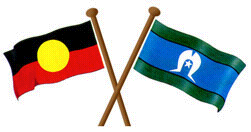 l and Torres Strait Islander. The Birra Li service aims to provide culturally appropriate support and education during pregnancy, after birth and for children up to early school years. This service includes antenatal care, child and family health care, immunisation, child health checks, support service referrals and health education. You may contact the staff at Birra Li directly, or talk to your GP or the staff at the Awabakal Medical Service or antenatal clinic to make a referral to our service.
l and Torres Strait Islander. The Birra Li service aims to provide culturally appropriate support and education during pregnancy, after birth and for children up to early school years. This service includes antenatal care, child and family health care, immunisation, child health checks, support service referrals and health education. You may contact the staff at Birra Li directly, or talk to your GP or the staff at the Awabakal Medical Service or antenatal clinic to make a referral to our service.
Please contact Birra Li: (02) 4016 4900
- If you think you are pregnant or have a positive pregnancy test
- If you have children between 0-5 years
Summary of models of care available
Summary of models of care available
| Options of Care | Suitability | Who will provide your antenatal care | Where you will have your pregnancy care | Who will provide care during labour and birth |
|---|---|---|---|---|
| Belmont Midwifery Group Practice (BMGP) | Women with uncomplicated pregnancy | Known midwife from the BMGP | Home / Belmont Birth Centre / Community Antenatal Clinic | Known midwife from the BMGP |
| Hunter Midwifery Group Practice (HMGP) | Women with uncomplicated pregnancy | Known midwife from the HMGP | JHH, one of our community clinics or at home | Known midwife from the HMGP |
| Midwifery Care in Community Antenatal Clinics | Women with uncomplicated pregnancy | Midwives from JHH Antenatal Clinic | Community Antenatal Clinic closest to your home | JHH Birth Suite |
| Birra-Li | Aboriginal and Torres Strait Island women or women having an Aboriginal and Torres Strait Island baby | Birra Li midwives and Aboriginal Health Care Workers | Home / Community Antenatal Clinics /JHH | JHH Birth Suite |
| Specialist Care at JHH | Women with pregnancies complicated by medical, obstetric conditions | Medical obstetric teams | JHH Antenatal Clinic | JHH Birth Suite |
| M3Team | Women with complicated pregnancies | Team of midwives and obstetricians, other specialists | JHH Antenatal Clinic | JHH M3 Team |
| Shared Care with GP | Women with uncomplicated pregnancy | GP of your choice; Antenatal Clinic midwife at Booking-in and 36 weeks | GP practice; 1st visit at Community Antenatal Clinic near you; 2nd visit at JHH | JHH Birth Suite |
| Care with private Obstetrician | All women | Private obstetrician | Private rooms | JHH Birth Suite |
Pregnancy support services
Pregnancy support services
Early Pregnancy Assessment Service (EPAS)
This service is available for women with early pregnancy abdominal pain,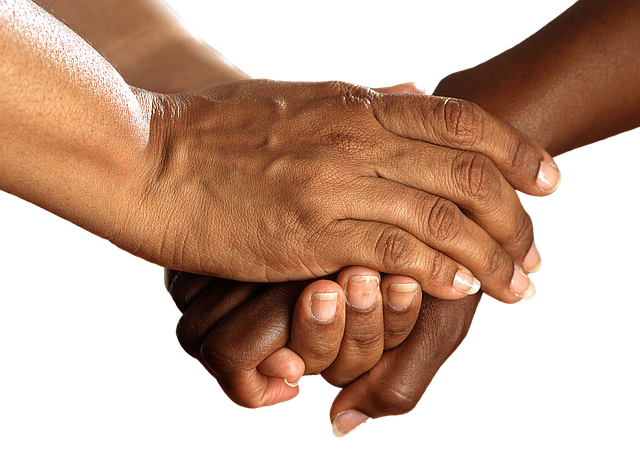 bleeding or severe vomiting (up to 18 weeks).
bleeding or severe vomiting (up to 18 weeks).
A referral by a medical practitioner (General Practice or Emergency Department) is required for this service. There is no capacity for self-referral.
Multicultural health services
The Multicultural Health Unit provides the following services to women from culturally and linguistically diverse (CALD) backgrounds:
- Health Care Interpreter Services
The Multicultural Health Unit provides professional health care interpreters for all women from CALD backgrounds. Health Care Interpreters assist women to communicate with their health professional during antenatal visits, classes, labour, postnatal period and other health-related occasions. If you need the assistance of a health care interpreter please let staff know and they will
book one for your appointment.
- MOMS (Mothers, Obstetrics, Multicultural
Service) Program
This program offers cultural support to women during pregnancy and up to six months after birth. This support includes linking women from the same backgrounds together to reduce isolation, share experiences, and discuss concerns and issues relating to pregnancy, birth, child care and parenting in a different cultural setting. This helps to identify potential cultural differences in those areas and the need for referrals to relevant health providers and/or community services and groups.
Please let your midwife know that you would like to receive this service, or you can contact the MOMS Service on phone (02) 4921 4497 or email: moms@hnehealth.nsw.gov.au
Aboriginal liaison officers
The John Hunter Hospital Aboriginal Liaison Officer is available to assist Aboriginal and Torres Strait Islander patients.
If you or your family require assistance in accessing hospital services, please ask one of our staff members to contact the Aboriginal Liaison Officer for you.
Family care midwifery service
The Family Care Midwives provide a caring and supportive outreach service to mothers with special needs who are attending the antenatal clinic or having Shared Care with their GP. The Family Care Midwife can see you in the antenatal clinic and/or visit you at home, providing individual care during your pregnancy and up to six weeks after the birth of your baby.
The Family Care Midwives can provide education about pregnancy, birth and early parenting. Your midwife can help bring together all the services you need in your pregnancy, and assist you with any problems that arise at this time.
After you have had your baby, the Family Care Midwives will help you make contact with Child and Family Health Services to provide continuing care when you and your family settle in at home.
Care and support for women with drug and alcohol problems
Some women may still be using alcohol or taking drugs during pregnancy. It is known that this can be very harmful to the unborn child. A number of skilled, non-judgmental and empathetic staff can provide a range of support. This will greatly improve the chances of having a healthy baby. Other services include the Drug and Alcohol Team and Social Work team.
Providing practical assistance and counselling – social work
Social workers are part of the health care team looking after you and your family while you are in hospital. In some situations, the social worker will routinely come to see you during your stay or at the time of your antenatal appointment. You may also wish to contact them yourself. This service is confidential and free.
Social Workers can offer counselling to individuals and families in all areas, including:
- Women or families experiencing difficulties during the pregnancy, such as family breakdown or financial difficulties
- Women or families considering adoption
- Information about community support services
If you wish to contact a social worker, you can contact the Social Work Department directly on (02) 4921 3700 or ask your midwife, doctor or other hospital staff involved in your care to contact a social worker for you.
Promoting healthy eating: dietitians
Both you and your baby need extra nutrients during all stages of pregnancy and breastfeeding. Eating a nutritious diet during pregnancy promotes healthy growth and development for your baby, prepares you for breastfeeding and is important for your own  wellbeing. It is important to remember that even though you are eating for two, there is no need to eat twice as much.
wellbeing. It is important to remember that even though you are eating for two, there is no need to eat twice as much.
A dietitian can assess your diet and suggest any changes that you may need to make. This is particularly important for women who are under- or over-weight, suffer from anaemia or a malabsorption illness such as Crohn’s or Coeliac disease, follow a vegetarian diet, or are diabetic.
You can arrange to see the dietitian at the Antenatal Clinic by phoning (02) 4921 3600 for an appointment, or by asking a midwife during your hospital stay.
Get Healthy in Pregnancy
The get healthy in Pregnancy Service is a FREE telephone health coaching service available to anyone aged 16 years and over. You will be able to talk with a qualified dietician or exercise physiologist over the phone in the privacy of your own home.
The service can help you to:
- Eat healthily
- Get active
- Gain or maintain a healthy amount of weight during your pregnancy
- Not drink alcohol during your pregnancy
- Return to your pre-pregnancy weight.
For Aboriginal women or women carrying an Aboriginal baby you may be able to speak with the Get Healthy Aboriginal Liaison Officer, for your first phone call or one of your coaching calls. The ALO will talk to you about your needs and your access to services in the community before referring you to either a dietitian or an exercise physiologist for the remainder of your phone calls.
Discuss referral to the service with your midwife at your booking-in visit or you can click the image below for more information and to refer yourself to the service.
Helping women to move well: Physiotherapy
A physiotherapist is available to give you advice or treatment on the discomforts that may arise during your pregnancy or after your baby is born. These may include back pain, pelvic pain, pelvic floor weakness, incontinence or abdominal muscle weakness.
If you wish to see a physiotherapist, contact them directly by phoning (02) 4921 3700 or ask your caregiver to contact them for you.
Belmont Midwifery Group Practice (BMGP)
Belmont Midwifery Group Practice (BMGP)
Some information about Belmont Midwifery Group Practice (BMGP) is listed on Options of Care During Pregnancy page. The following provides further details for you to consider.
The Belmont Midwifery Group Practice is a model of care offered by John Hunter Maternity Serivces which provides women centred care through pregnancy, birth and for up to two weeks after the birth of your baby. Belmont Birthing Centre is a free-standing birthing unit located on the second floor of Belmont District Hospital, Croudace Bay Road, Belmont. It is staffed by a team midwives who offer holistic and expert midwifery care.
The philosophy for BMGP is to provide continuity of midwifery care for women and their families. The midwives in this group practice believe that pregnancy, birth and becoming parents is a normal life event, and they will help to prepare you to achieve an active labour and birth.
The model of care offers a warm, family-friendly low technology environment. You will be allocated a primary care midwife who will care for you throughout your pregnancy, birth and for up to two weeks at home. If at any time your primary midwife is on leave you will be cared for by another midwife in the BMGP team. You will get to know most of the midwives in the team. You may also choose to see your GP for your routine pregnancy blood tests and scans.
Belmont Midwifery Group Practice is staffed by experienced midwives who consult and collaborate with an Obstetrician at John Hunter Hospital as required.
This model of care is available to women who have a healthy pregnancy with normal risk of obstetric or medical conditions. The midwives at your booking visit will discuss with you whether this is a suitable option.
Belmont Midwifery Group Practice offers:
- Birth at the Belmont Birthing Centre.
- A public health funded homebirth service: some women who book to have their babies under the care of BMGP choose to have a planned homebirth with the care and support of Belmont midwives. If this is an option that interests you, please ask your midwife at Belmont for more information. There are some restrictions including set geographical boundaries that we are happy to discuss with you
- Allocation of an experienced midwife as your primary carer
- Supportive care by a small team of midwives working with your primary midwife
- Flexible appointment systems
- Comfortable, relaxed and calm surroundings including baths for water immersion in labour and/or birth
- Support and promotion of natural ways to manage the sensations of labour, remembering that when women are relaxed and feel supported by someone they know and trust, they manage labour well with their own pain-relieving hormones
- 24-hour access to phone advice by a BMGP midwife
- Provision for post-natal care for four to six hours in the unit, and up to two weeks in your home
Obstetric medical officer services are not provided onsite.
If you require referral to an obstetrician for ongoing care during your pregnancy
Some women do unfortunately develop conditions during their pregnancy which are better managed by an Obstetrician.
If these conditions develop before 37 weeks of pregnancy, your primary midwife is required to handover your care from the BMGP to a doctor and other members of the maternity team at JHH. This will mean the BMGP midwife will be unable to care for you during labour, birth and the postnatal period.
However, women who develop reasons for needing medical care after they reach 37 weeks will be provided ongoing care by their BMGP midwife in partnership with the medical staff at JHH. They will be supported by the BMGP to have their baby at JHH.
Please click on the Virtual tour link below to view the Belmont Birth Centre environment.
The BMGP welcomes your enquiries. Tours of the unit can be arranged. Belmont Midwifery Group Practice can be contacted by phone on (02) 4923 2108.
Next birth after caesarean
Next birth after Caesarean
For pregnant women who have experienced a caesarean section for a previous birth, they may be considering the best birth option for their current pregnancy. At John Hunter Hospital, we acknowledge that a vaginal birth after a previous caesarean section is often a suitable and safe option for the majority of women. Your midwife and Obstetrician will discuss this with you during your IMAP visit.
At JHH, we offer free education sessions to help the woman and her partner to further explore their birth options and assist their decision making. In these education sessions the woman will also discover strategies to optimise the birth experience regardless of her birth intention.
For further information on NBAC please see the following factsheet and follow the link http://www.health.nsw.gov.au/kidsfamilies/MCFhealth/Publications/birth-after-caesarean-english.PDF
Birth Suite and Birth Centre
Birth Suite and Birth Centre
The JHH Birth Suite and Birth Centre are located together on level 3 at JHH.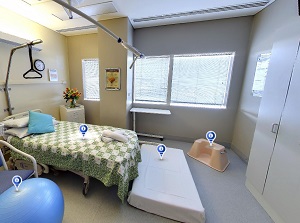
The Birth Suite, formerly known as Delivery Suite or Labour Ward, cares for women with normal to high risk of obstetric or medical
conditions occurring, and while supporting normal labour and birth, staff in Birth Suite can provide extra monitoring of mother and baby or extra interventions if required.
The Birth Centre is an area for healthy women with normal risk of medical or obstetric conditions, where normal labour and birth are supported by her partner and midwives, with easy access to further help if required.
When you arrive at JHH, go straight to the Birth Suite reception desk. You will be met by a midwife or receptionist and taken to an available room that best suits your needs, or to the waiting area of the Maternity Assessment Day Unit.
Virtual tour of JHH maternity services
Visit our virtual tour of the Birth Suite, Birth Centre, Maternity Assessment Day Unit, antenatal and postnatal wards at John Hunter
Hospital, as well Belmont Birthing Service.
Maternity Assessment Day Unit (MADU)
The MADU is an area where pregnant women may be directed to go following an antenatal clinic visit, or after speaking with a midwife in Birth Suite. Reasons may include: being more than 41 weeks pregnant, waters leaking after 37 weeks and not in labour, high blood pressure, and other events. While in MADU, a comprehensive assessment will be undertaken, and this could take about 4 hours.
When you are ready to birth, or require a closer monitoring, you will be transferred to the Birth Suite. Alternatively, you may be discharged home from MADU with a follow up plan of care.
Travelling to have your baby in hospital
- Contact the midwife in the Birthing Service (or your own midwife as arranged) for advice.
- Wear a sanitary pad (or more!).
- Have your support person drive safely, and use your seat belt with lap belt positioned below your baby. Have old towels available to catch leaks if they occur, and an old ice-cream bucket in case of nausea or vomiting.
- In NSW, an ambulance ride can be very expensive; it is strongly suggested that you join an ambulance fund for your family emergency situations, if you are not already covered by private health insurance (this may be done through any major private health fund office or online).
- Bring your antenatal record. Your antenatal record provides us with your history and plan of management for labour and birth. Please carry it at all times, and present it to the midwife or receptionist on your arrival to the Birth Suite.
A plan for going home after birth
For most women, pregnancy and birth is a healthy experience. Many women choose to go home from the hospital soon after the baby is born, and take advantage of our Home Midwifery Service (HMS). This is dependent on both mother and baby being well, baby has had the first feed, and mother is confident going home with adequate family support. You can go home straight from
Birth Suite/ Birth Centre. A physical examination of mother and baby will be done before you leave. All the necessary documents and supportive information will also be provided. The midwife from the HMS or Midwifery Group Practice will contact you the day after your discharge and inform you of an approximate time for your home visit. They may visit you for up to about 5 days after birth, depending on your circumstances.
Husband / partner / support persons in labour and birth
We welcome people who will support and encourage you throughout labour and birth. There is room for a maximum of two support people at any one time in the Birth Suite.
Doulas
It is the woman’s choice who supports her during pregnancy, labour, birth and the postnatal period. A doula is a layperson, identified by the woman, who provides continuous support during the antenatal period, childbirth and the postnatal period. The
doula attends as an employee of the woman. Under normal circumstances each woman is able to have two support people with her in delivery suite. A doula is to be considered one of the two support people.
Hunter New England Local Health District (HNELHD) is open to the use of doulas at birth, and maternity services will facilitate a productive, receptive environment for doulas to support women. However, HNELHD clearly states that it does not accept responsibility and is not accountable for any actions or advice given to labouring women by doulas.
Visitors
If there are some visitors you would like to visit you soon after the birth of your baby in the Birth Suite, we request that your visitors check at the Birth Suite desk before proceeding to your room. This is to protect your privacy and the privacy of other
women in the unit. Please be aware that there is no waiting room for visitors in the Birth Suite.
Enquiries while in Birth Suite
To protect your privacy and confidentiality, information is not given to people enquiring about you without your consent. We will take messages for you to contact the enquirers at a convenient time.
Video recording and photography
We respect your wish to film labour and birth. However, all staff have the right to refuse to be identified on film or refuse filming during specific procedures. Please inform your midwife of your intention to film. If your baby is born in the Obstetric Operating Suite, only still photographs may be taken.
Children
There are no childcare facilities at JHH or the Birth Suite. If you wish to have your children present for labour and birth, we request you have one adult, other than your main support person to care and supervise. However, the limit of two additional
people at a time will also need to be considered.
Mobile phones
We ask that all mobile phones are turned to silent mode in the Birth Suite, Birth Centre and ward environments.
Keeping baby with you following birth
Your baby will remain with you following birth. Skin-to-skin is encouraged for a minimum of 1 hour after the birth or until the first breastfeed. Skin to skin contact stimulates the mothers’ production of the oxytocin hormone, which decreases bleeding, promotes bonding and breastfeeding. It allows the baby to smell, touch and know mum as well as stay warm. When the baby shows signs of
readiness, he/she will be able to breastfeed.
It is strongly suggested that during this important time the baby stays with mum, rather than being handed around to other family members. The father of the baby has an important role in protecting the new mother and baby.
After your baby has fed, he / she will be weighed and measured. With your consent, Vitamin K (Konakion) and Hepatitis B vaccine injections will be given at this time.
Two arm-bands with the baby’s correct identification details will be placed on the baby’s arm and leg – the midwife will ask you to check these details to ensure they are accurate. The identifying number on the mother’s armbands are the same as the baby’s, so it is important that you make sure the identifying numbers correspond.
The armbands are routinely checked by the midwives. Should the armbands fall off, please tell the midwife as soon as you can so that new armbands can be provided.
If medical treatment is required for your baby, then he or she may be taken to the Neonatal Intensive Care Nursery or Special Care Nursery adjacent to the Birth Suite. As soon as possible, you will be able to visit and care for your baby.
What happens to the placenta (afterbirth)?
After the birth of your baby, the placenta will be disposed of in accordance with NSW Health Guidelines.
On some occasions the placenta may be sent to the Pathology Department, for extra information. This may happen if you gave birth to twins, or if you or your baby has a serious medical or obstetric condition.
If you would like to take your placenta home please talk to your midwife.
Stem cell collection and storage
If you are interested in the collection of stem cells from your baby’s cord blood for possible future use, you need to organise this with one of the private companies several weeks before coming to hospital to birth your baby. You will need to organise the collection, equipment, courier service and storage with the private company.

